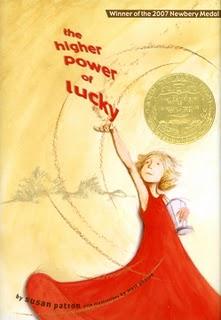The Higher Power of Lucky

Censorship advocates have a lot to dislike in Susan Patron’s Newbery Medal children’s book The Higher Power of Lucky. Aside from the “scrotum” controversy (the word appears on the first page and prompted a flurry of “how dare she put this is a children’s book!”), there are Alcoholics Anonymous meetings, a mother in jail for dealing marijuana, a delinquent father and surplus U.S. government cheese.
Fortunately, however, the American Library Association, the organization that awards the Newbery Medal, ignored critics’ complaints. The Higher Power of Lucky is a beautiful coming-of-age story about an orphaned girl, Lucky, living in the remote California desert town of Hard Pan, population 43, where everyone survives on government support and twelve-step meetings. Lucky is a budding scientist constantly on the prowl for specimens while searching for her higher power and is followed by her friend Lincoln, a compulsive knot tyer, a cookie-consuming fiend Miles and HMS Beagle, a dog named after Darwin’s exploration ship. After Lucky’s mother dies, her father’s first wife, a French woman named Brigitte, arrives in Hard Pan to take care of Lucky until she can be placed in a foster home. Like all good orphans, Lucky develops a scheme to run away and the resulting (mis)adventures bring her to terms with her mother’s death and her new life with Brigitte.
Unlike other tales of ragtag orphans who find themselves, Patron’s book is notable for how it infuses socio-economics into Lucky’s story. It’s clear that the townspeople of Hard Pan are not well-off, but Lucky loves her hometown and its oddball collection of interesting folk. She doesn’t pine for a bigger life or wish she owned more material goods. Lucky’s love for her life creates a space for the majority of children who do not grow up with $500 per week allowances and a dad’s credit card in their back pocket, and Patron does a marvelous job of indulging in a sometimes harsh reality through clever and whimsical prose.
The Higher Power of Lucky successfully creates a space for youth who are acting like youth to be who they are without judgment by reminding adults that children are also complex beings with self-doubts, fears and hopes, as Lucky and her friends experience, and that it’s all of these experiences collected that will shape an individual into a human being. Patron’s ability to build on themes that reach both young people and adult readers is what makes Lucky’s story such a treasure.
Why you gotta hate on Dad's credit card?
It is a beautifully unconventional book. It's unfortunate that it received so much (unnecessary) negative publicity. --Lacey D.
I was thinking of getting this book, and this very well-written review convinced me. It sounds awesomely unconventional.